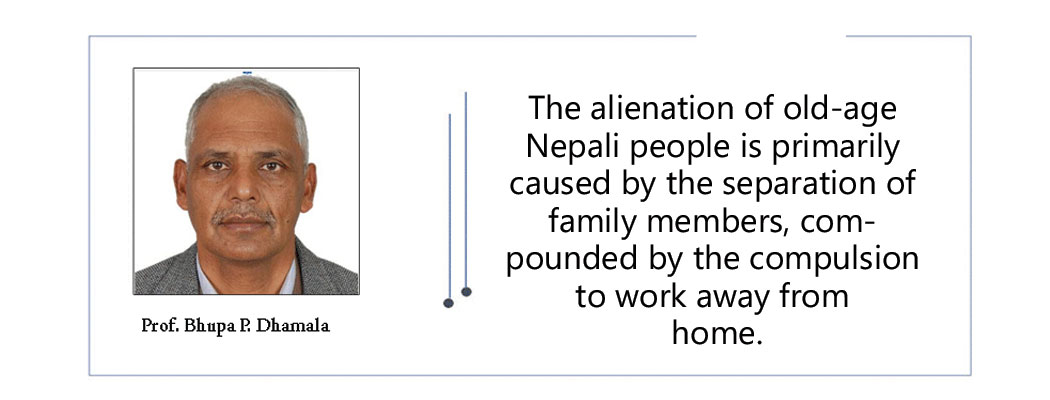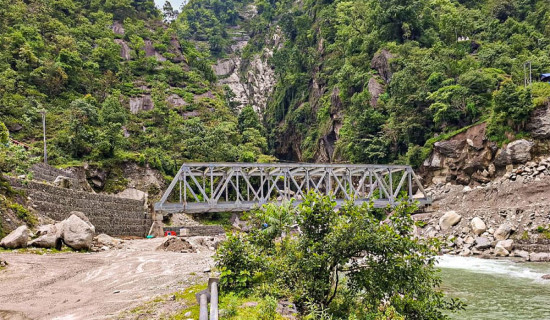- Saturday, 7 June 2025
Ease Old-age People’s Alienated Life
What Karl Marx said about alienated labourers one and a half centuries ago is equally applicable to old-age people of our times, especially those in undeveloped countries. While trying to explain the plight of workers, Marx claimed that human beings are reduced to the level of animals, compelled to work only to meet the physical requirements of food. As he argued, workers are isolated from their families and society due to intensive work for low pay.
Similarly, old-age people, especially those living in rural areas, are isolated from their children who go to urban spaces in search of jobs for their livelihood. This has become a more pressing issue in our country for about half a century.
Alienation is a sense of loneliness or estrangement in people caused by family separation, societal segregation, and geographical isolation. Likewise, people are alienated for a variety of reasons – work without leisure, cultural encounter, physical weakness, serious illness, death of a spouse, old-age seclusion, and a host of others.
Old-age alienation
When somebody has to work days and nights to earn a living, they have no leisure time for entertainment with family members and social interaction. Some people encounter alien cultures when they go to an unknown place and meet unfamiliar people with different languages. Some other people feel isolated when they are seriously ill, physically impaired, or deformed. The death of a spouse causes the bitter most isolation.
Among others, old-age alienation is the most characteristic feature of all cultures. We find similar situations of the old-age people wherever we go – Europe, Africa, America, and Australia. This is not because all young people are indifferent to their parents and grandparents but because they are too busy at work. No one is to blame for this misfortune. Maybe this is the plight of old-age people who have been undergoing it since time immemorial.
Old-age alienation has become a menace in our time. Bertrand Russell (1872-1970) envisaged it when he argued that the increase in life expectancy due to the discovery of modern medicines had been one of the greatest perils of modern times. Despite the decrease in birth rate, medicine has lengthened our life resulting.
We feel that long life is better than a short span because we will have left nothing undone as we wish. Our children also are happy to live with parents as guardians because they think their burden of responsibility will significantly be lightened. But neither parents nor children are unaware of the consequences of too long a life. Ironically, old-age people have created a burden on themselves with long life. The intensity of alienation that they bear is beyond imagination.
This is not to argue, however, that longevity of life is always a curse. If managed properly, it might as well be a blessing to humanity. The experience of old-age people, if not with the vigour of youth, can be useful to society. The only physical pain that old-age people have to bear is unshareable. But the mental burden can somewhat be lightened by the children of old-age people if they are wise enough.
Despite ignorance of ways to maintain general health, the modern medical system has lengthened the life of the Nepal people. Now the average life expectancy is seventy years which was below fifty not long ago. Consequently, the old-age population has been alarmingly increasing in recent years. Our government is proud of its success in lengthening our life. Happy though we are for our longevity, we nonetheless are haunted by the sense of impending disaster of old-age alienation.
While the youths are migrating to towns in search of jobs, the elderly people are left at home to look after their grandchildren. This is joyous as far as the grandchildren remain small. But as soon as they grow up, they go to schools, preferably in towns. Then the grandparents are left utterly alone with nobody to live together with, let alone take care of them. In hills, Himalayas, and plains, the doors of almost all houses are opened only by elderly people.
With a gloomy face, they spend all day sitting under the house porch, looking at the path from where their children and grandchildren had left home. Deep down in their heart, they expect their dear ones to return home, but to no avail. The old-age people are tolerating the intolerable.
They feel nostalgic about their past when they were young and energetic. They recall their dreams of making an ideal family living together despite physical hardships and troubles. Now they look disappointed, abandoning the hopes that they had cherished in the past. The alienation of old-age Nepali people is primarily caused by the separation of family members, compounded by the compulsion to work away from home. In many cases, the youths have fled to a foreign land, making it difficult to return home to reunite with their parents.
Appropriate policies
There is no denying that old-age alienation is somewhat natural because any technological device or magical medicine cannot stop aging. No evidence has yet concluded that humans can be immortal. Nor has any scientific research found a cure for hitherto incurable physical ailments. So, everybody has to undergo this fate sooner or later. Since youths are fleeing to foreign lands in search of job opportunities, rural houses are vacant; fields are barren; villages are deserted, resulting in intense old-age alienation. Yet, simple management can ease the miserable life of old-age alienated people.
We should encourage our youths to stay in their birthplace and migrants to return home. The government should formulate appropriate policies and make substantial plans to solve the unemployment problem, which is driving youths away from their homeland.
The youths should also consider making their land a paradise, leaving the urban dreams aside. Individual effort counts much in this initiative, but that is not enough. The effort of the entire society is essential to ease the old-age alienated people’s lives in a real sense.
(The author is the chairman of Molung Foundation. bhupadhamala@gmail.com)









-original-thumb.jpg)







